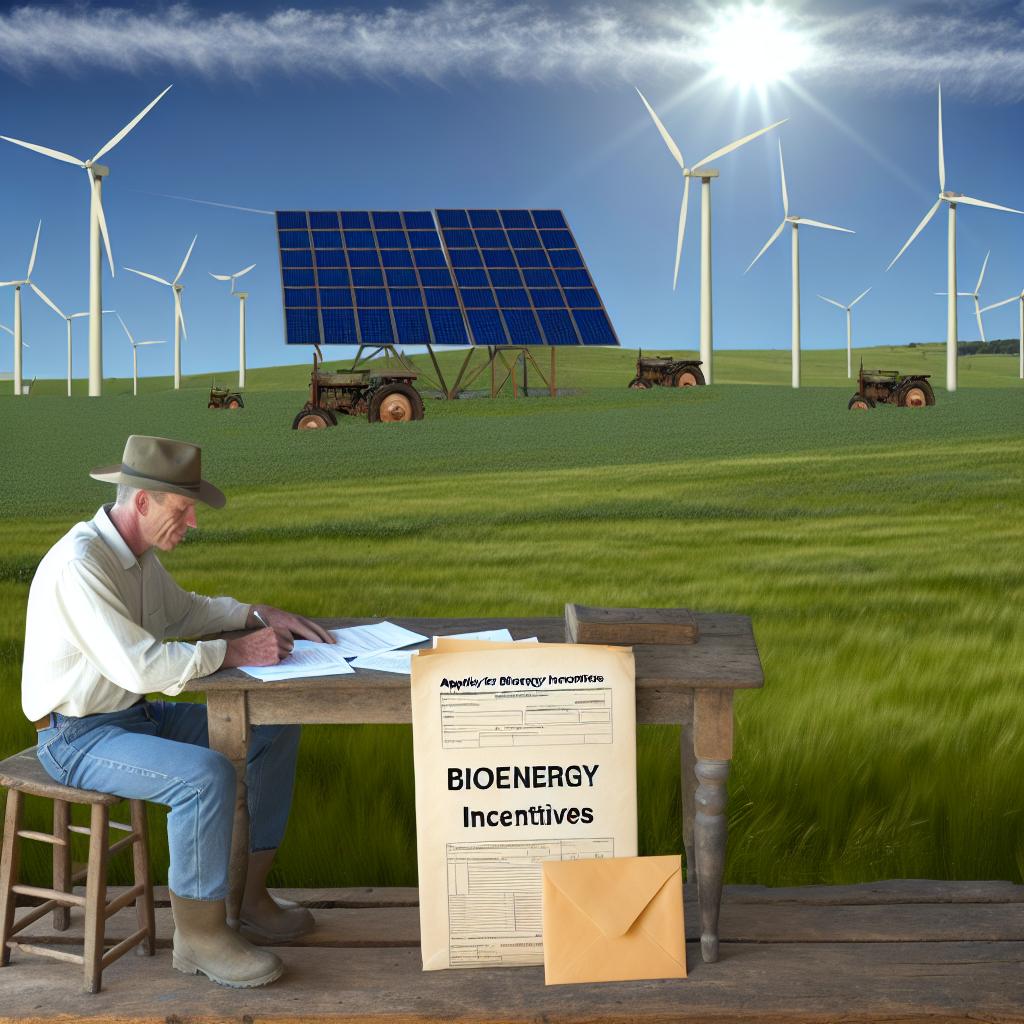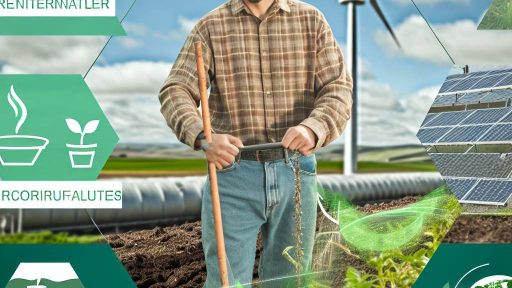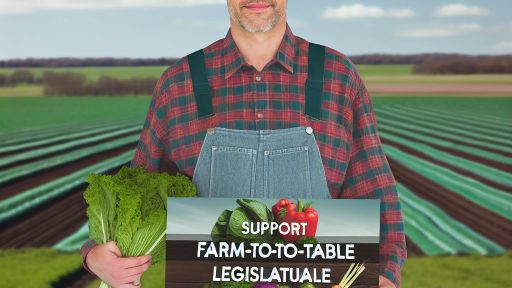Understanding Bioenergy
Definition and Overview
Bioenergy refers to energy produced from organic materials.
This includes plant materials, agricultural waste, and animal dung.
Essentially, it transforms biomass into usable energy forms.
Bioenergy plays a crucial role in sustainable farming practices.
It provides farmers with a renewable energy source.
Moreover, it helps reduce reliance on fossil fuels.
Importance in Sustainable Farming
Bioenergy contributes to environmental sustainability.
It minimizes greenhouse gas emissions significantly.
This practice also supports soil health and biodiversity.
Additionally, it creates economic opportunities for farmers.
Farmers can turn waste products into valuable energy.
This process can enhance farm profitability over time.
Integration into Farming Practices
Farmers can adopt various bioenergy technologies.
Examples include anaerobic digestion and biofuel production.
These methods convert waste into energy efficiently.
Transform Your Agribusiness
Unlock your farm's potential with expert advice tailored to your needs. Get actionable steps that drive real results.
Get StartedFurthermore, bioenergy systems can diversify farm income.
Implementing these practices fosters resilience against market fluctuations.
Ultimately, investing in bioenergy supports long-term sustainability.
Overview of Available Bioenergy Incentives for Farmers
Types of Bioenergy Incentives
Farmers can access several bioenergy incentives to enhance sustainability.
These incentives often include grants, tax credits, and low-interest loans.
Additionally, some programs provide cost-share assistance for bioenergy projects.
Federal Programs
The U.S. Department of Agriculture offers valuable bioenergy incentives.
One significant program is the Rural Energy for America Program (REAP).
REAP provides grants and loans to support energy efficiency and renewable energy projects.
Another critical program is the Biomass Crop Assistance Program (BCAP).
BCAP provides financial assistance for biomass feedstock production and processing.
State-Level Initiatives
States may offer specific initiatives tailored to regional needs.
Many states have renewable energy grant programs for farmers.
Incentives can also include local tax exemptions for bioenergy systems.
It’s essential for farmers to research programs available in their state.
Private Sector Opportunities
Private companies also provide incentives related to bioenergy.
Some energy corporations offer rebates for renewable energy installations.
Additionally, non-profit organizations may assist with funding and resources.
Farmers should explore partnerships with these entities for additional support.
Application Process
Applying for bioenergy incentives requires careful planning.
Farmers should begin by identifying suitable programs for their needs.
Next, they need to gather and prepare essential documentation.
Additionally, attending informational sessions can provide helpful guidance.
Finally, submitting a well-prepared application increases the chances of approval.
Showcase Your Farming Business
Publish your professional farming services profile on our blog for a one-time fee of $200 and reach a dedicated audience of farmers and agribusiness owners.
Publish Your ProfileEligibility Criteria for Applying for Bioenergy Incentives
Basic Requirements
Farmers must demonstrate active farming operations for eligibility.
They need to provide proof of ownership or lease agreements.
Additionally, their farming activities should align with sustainability goals.
Types of Bioenergy Projects
Eligible projects typically involve producing biofuels or biogas.
These projects may include anaerobic digesters and biomass energy systems.
Moreover, education and outreach efforts can qualify for incentives.
Compliance with Environmental Regulations
Applicants must adhere to local environmental regulations.
They should also implement practices that reduce ecological impacts.
This compliance ensures a positive contribution to sustainability efforts.
Financial Documentation
Farmers must present financial statements for the past three years.
Access to adequate funding sources is necessary for project initiation.
They should also prepare to submit a detailed project budget.
Technical Feasibility
Projects need to demonstrate technical feasibility through assessments.
Having a qualified engineer review project plans is advisable.
This ensures that proposals are manageable and practical.
Community Impact
Applicants should outline benefits to the local community.
This can include job creation and economic growth initiatives.
Additionally, they must discuss contributions to energy independence.
Explore Further: Strategies For Farmers To Benefit From Trade Agreements
Step-by-Step Guide to Completing the Application Process
Gather Necessary Documentation
Start by identifying all required documents for the application.
These documents typically include proof of your farming operation.
Additionally, prepare receipts for any previous bioenergy-related expenses.
Ensure your business plan is current and reflects your bioenergy goals.
Understanding Eligibility Criteria
Review the eligibility criteria set by your local authority.
Check if your farming practices align with sustainable bioenergy standards.
Consider if your operation qualifies for tax incentives or grants.
Research any specific regional requirements that may apply.
Fill Out the Application Form
Obtain the official application form from the appropriate agency’s website.
Carefully complete each section of the application form.
Use consistent and accurate information throughout the application.
Double-check for any errors or omissions before submission.
Submit the Application
Submit your application via the specified method, whether online or by mail.
Include all supporting documents as required.
Ensure you keep copies of your submission for your records.
Follow Up on Your Application
After submission, monitor the status of your application regularly.
Reach out to the agency if you haven’t received confirmation.
Maintain communication in case any additional information is needed.
Await Decision and Funding
Once your application is processed, await the funding decision.
Be prepared to provide additional information if requested.
Upon approval, understand the terms associated with the funding.
Showcase Your Farming Business
Publish your professional farming services profile on our blog for a one-time fee of $200 and reach a dedicated audience of farmers and agribusiness owners.
Publish Your ProfileDiscover More: Benefits Of Integrated Pest Management Strategies
Documentation Required for Bioenergy Incentive Applications
General Requirements
Applying for bioenergy incentives requires specific documentation.
First, gather essential identification documents.
These documents include your tax identification number.
Additionally, provide proof of farming operations.
This could be in the form of land titles or leases.
Project Proposals
Prepare a detailed project proposal for your application.
This proposal should outline your bioenergy plan.
Clearly define your goals, timelines, and expected outcomes.
Include any technological specifications for the bioenergy project.
Financial Documentation
Complete financial documents play a vital role in your application.
Provide a complete budget estimate for the project.
Include documentation of available funding sources.
Tax returns for the last three years can strengthen your application.
Environmental Impact Assessments
Environmental assessments are crucial for bioenergy projects.
Include a detailed analysis of your project’s possible impacts.
Address how you will mitigate any negative effects.
This assessment should comply with local regulations.
Supporting Letters and Endorsements
Endorsements from local organizations can enhance your application.
Gather letters of support from community groups or environmental organizations.
These letters should highlight the benefits of your project.
Include testimonials from local agricultural committees if possible.
Compliance and Regulatory Documentation
Complying with local and federal regulations is essential.
Include any necessary permits or licenses in your application.
Keep records of compliance with agricultural guidelines.
This documentation assures reviewers of your project’s viability.
Final Checklist
Before submission, compile all required documents.
Create a checklist to ensure completeness.
Double-check for any missing items or errors in your application.
Finally, consider seeking feedback from peers before submission.
Find Out More: Complying With Import Export Regulations In Modern Farming

Common Challenges and Solutions in the Application Process
Navigating Complex Regulations
Many farmers face complex regulations when applying for bioenergy incentives.
Understanding these regulations is crucial for successful applications.
Seek guidance from agricultural consultants who specialize in bioenergy.
They can help clarify necessary documentation and compliance requirements.
Gathering Required Documentation
Another challenge is gathering the required documentation for the application.
Farmers often overlook necessary permits and certifications.
Create a checklist of all required documents before starting the process.
Organizing documents will streamline the application submission.
Understanding Financial Implications
Financial implications can be a significant concern for farmers.
Showcase Your Farming Business
Publish your professional farming services profile on our blog for a one-time fee of $200 and reach a dedicated audience of farmers and agribusiness owners.
Publish Your ProfileMany are unsure about the potential costs and benefits of bioenergy projects.
Consult with financial advisors who understand agricultural financing options.
They can provide insights into budgeting and long-term financial planning.
Time Management Issues
Time management is another common obstacle in the application process.
Farming activities often take priority, leaving little time for applications.
Develop a timeline for each step of the application process.
Breaking the process into manageable tasks can help alleviate pressure.
Failure to Follow Up
After submission, farmers must follow up on their applications.
Some may forget to check on the status of their applications.
Set reminders to check in periodically on application progress.
Prompt follow-ups can ensure important updates aren’t missed.
Networking and Support
Networking with other farmers can provide valuable support.
Join local agricultural organizations focused on sustainable farming.
Participating in these groups can help share experiences and best practices.
Connecting with peers can also lead to collaboration on bioenergy projects.
Uncover the Details: Comprehensive Overview of Agricultural R&D Funding Opportunities for Farmers
Case Studies: Successful Applications for Bioenergy Incentives in Farming
Innovative Approaches
Many farmers have utilized innovative approaches to secure bioenergy incentives.
For instance, Sarah Green from Green Fields Farm converted waste into biofuel.
This process reduced her energy costs significantly.
Moreover, it showcased a sustainable model for bioenergy production.
Collaboration with Local Agencies
Collaboration plays a crucial role in accessing bioenergy incentives.
Jane and Tom Harper partnered with their local agricultural agency.
They participated in workshops that educated them on available funding.
This partnership ultimately led to successful grant applications.
Integration of Technology
Technology integration enhances the efficiency of bioenergy projects.
The Johnson Family Farm adopted advanced biogas systems.
These systems utilize livestock waste to generate energy.
As a result, they met their energy needs while reducing waste.
Community Impact and Engagement
Successful applications often engage the community effectively.
The Downtown Farm Collective initiated workshops for local farmers.
These workshops focused on bioenergy options and funding opportunities.
This initiative empowered community members to explore sustainability.
Lessons Learned
Learning from experience is essential for future successes.
Farmers should document their application processes for reference.
Seeking feedback from experts can also provide valuable insights.
Continuous improvement will yield better results in future applications.
Future Trends in Bioenergy Incentives and Their Impact on Sustainable Agriculture
Emerging Bioenergy Technologies
Bioenergy technologies are rapidly evolving and gaining traction in agriculture.
New methods enhance energy efficiency and sustainability.
For instance, anaerobic digestion is becoming popular among farmers.
This process converts organic waste into biogas, reducing emissions significantly.
Showcase Your Farming Business
Publish your professional farming services profile on our blog for a one-time fee of $200 and reach a dedicated audience of farmers and agribusiness owners.
Publish Your ProfileMoreover, crops like switchgrass and miscanthus show promise as energy crops.
Government Policies and Incentives
Government policies are crucial for promoting bioenergy in farming.
Incentives like tax credits and grants encourage farmers to adopt bioenergy technologies.
Additionally, these policies help offset initial investment costs.
Recent initiatives aim to increase funding for renewable energy projects.
Therefore, more farmers can participate in bioenergy programs.
Market Demand for Renewable Energy
There is a growing demand for renewable energy sources across various sectors.
Consumers are increasingly favoring sustainably produced goods.
This shift is driving farmers to integrate bioenergy solutions into their operations.
For example, local communities are supporting biofuel production initiatives.
Consequently, this trend creates new market opportunities for farmers.
Environmental Sustainability
Bioenergy contributes significantly to environmental sustainability in agriculture.
It reduces dependency on fossil fuels, lowering greenhouse gas emissions.
Additionally, sustainable practices improve soil health and biodiversity.
Farmers adopting bioenergy systems can enhance ecosystem resilience.
Ultimately, these practices foster a more sustainable agricultural landscape.
Innovation and Collaboration
Innovation plays a vital role in advancing bioenergy in agriculture.
Collaborative efforts among universities, government, and industry can drive research.
Such partnerships focus on developing effective bioenergy solutions.
Furthermore, knowledge sharing among farmers enhances best practices.
This ensures that sustainable methods proliferate across agricultural sectors.
Additional Resources
Alternative Fuels Data Center: Ethanol Laws and Incentives in Federal




